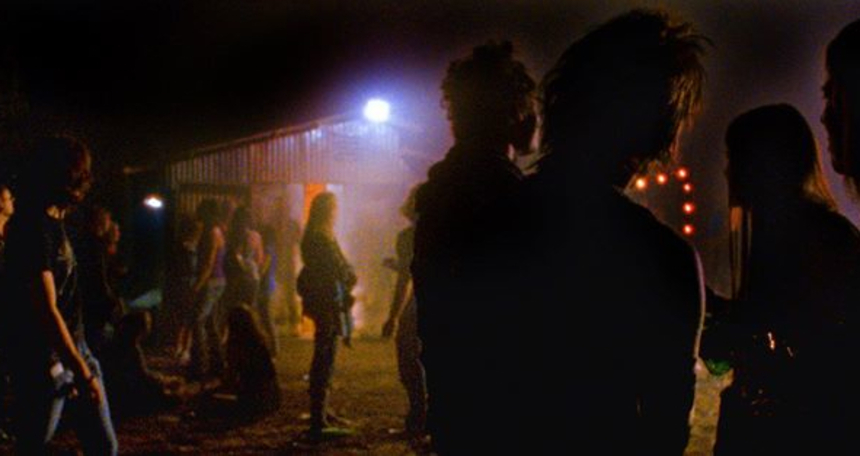LA Film Fest 2013 Review: ALL TOGETHER NOW, In The Woods, Rocking Out, And Philosophizing The Night Away

Ron (Lou Taylor Pucci) is putting on a concert in the woods. This isn't about money, it's totally a grass-roots and word-of-mouth kind of thing, put on for the pure enjoyment and camaraderie that can only be cultivated from a night like this. Though the bands featured fall under the pretty wide banner of noise rock (a genre that largely eschews traditional songwriting structure and embraces atonality with a vengeance), Ron's little experiment in togetherness draws a cavalcade of characters from all walks of life to this one musty little shed.
We've got perpetually perky dad Bruce (Hal Dion), a human rights organizer and alien enthusiast, who entrusts the well-being of his teenage daughter Ashley (Hannah Sullivan) and her friends to his mustachioed employee Richard (Will Watkins) and his less-than-bemused girlfriend Tegan (Monika Jolly). Then there's Michelle (Lindsey Garret), a twenty-something activist who's questioning her place in the scheme of things while her friend Sam (Morgan Krantz) pines hard for her. And then we have Ron's most hyper and enthused friend Zeke (James Duval). Zeke happens to be in possession of what he describes as life-altering, indeed life-affirming materials: two 100 pound anvils, one of which will be launched 200 feet into the air by explosive powder, and thus, according to him, be a prime example of how we're masters of our own universe. It's a spirited conceit and one that drives the film to some existential territory and keeps the core theme of creating our own destinies (whether consciously or unconsciously) firmly in place for its smooth running time
Outside of pre-teen Gulliver (Jerry Phillips) and his mentally unstable father George (James C. Burns), the bands and their music ultimately serve three purposes. Obviously the catalyst that brings everyone to this tiny make-shift shed in the middle of nowhere, the music then serves as brief interludes and bridges for the multiple and sometimes intersecting stories of the 20+ characters, while most importantly accenting each of thee journeys we follow through the night. For instance, as the ambient dissonance of Pedestrian Deposit bleeds out into the woods, the film turns a darker shade, one that it has been certainly building to, but absolutely embraces in the moment when Anon (Luke Stratte-McClure, looking very out of place at the concert in a sharp suit and tie combo) is confronted by Abel (Tucker Bryan). The buzzed young man recognizes Anon as the now semi-famous son of a Donald Trump-like figure: one who just hours before publicly denounced and attacked his father during a televised event.
Entering the abyss as it were is a tricky thing to balance, but Mirecki and his co-writer Ryan Kasmiskie bring to their script a tonal balance that ebbs and flows, thrashes and throws, skips and starts from melancholic to downright destructive to joyous without losing hardly a lick of wit and humanity in the process. While some characters and their stories are more compelling than others, there really isn't a dud amongst the lot.
In turn, Gal Muggia's editing utilizes less a frenzied and cheap nature in the concert montage, instead aiming for an authentic, pulse-pounding euphoria; it's something that is expansive and fertile, and yet constantly threatening to collapse in on itself in a fit of joy. These moments then effortlessly segue outside wherein the characters need considerably more breathing room to contemplate their self-worth or encounter a new romantic interest or face their conflicted sexuality.
What totally sold the movie for me though -- making it a must for big screen viewing -- is Zoran Popovic's Super 16mm cinematography. It's grainy and gritty and gloriously dark and murky, with most characters lit in silhouette or illuminated by odd spots of bright orangy light, twinkling, if briefly, like stars in the night sky. Indeed, being shot on film makes All Together Now feel like a relic from a bygone era, but what makes the film such a pleasure to watch is the simple notion that being in the moment is the best damn thing there is... even when a furious middle-aged man interrupts your festivities by trying to murder the sound engineer with a katana.

Do you feel this content is inappropriate or infringes upon your rights? Click here to report it, or see our DMCA policy.






